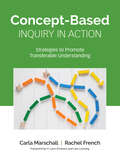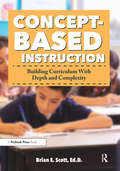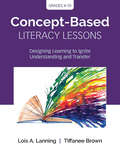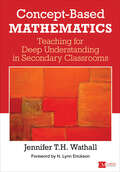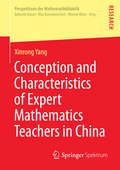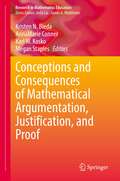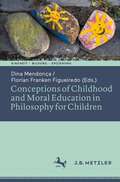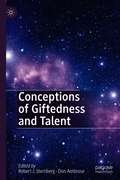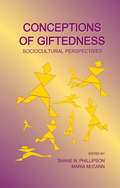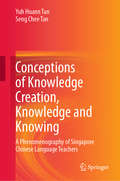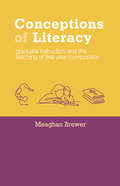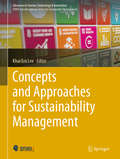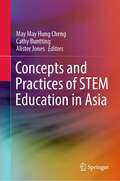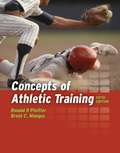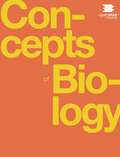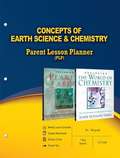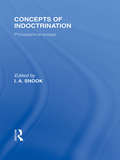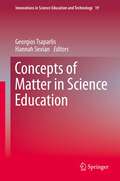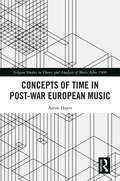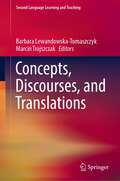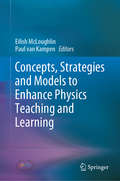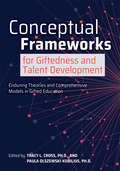- Table View
- List View
Concept-Based Inquiry in Action: Strategies to Promote Transferable Understanding (Corwin Teaching Essentials)
by Rachel French Carla Marschall"This is exactly what my school needs right now to support colleagues to build on the foundations of our written concept-based curriculum and to take-off our taught curriculum to the next - and highest - levels." Neville Kirton, Deputy Head of Secondary Colegio Anglo Colombiano, Bogota, Colombia "Filled with strategies, illustrations, diagrams, and pictures, this book really gives you the insight you need to help students better understand what they are learning. So many great ideas that can be used in any classroom. A must read for all educators." Amanda McKee, 9th, Algebra/Geometry, Secondary Certified Instructor/Mentor Johnsonville High School, Johnsonville, SC Create a thinking classroom that helps students move from the factual to the conceptual All students deserve the opportunity to think conceptually. But seeing conceptual relationships does not come naturally to every student. How can teachers construct thinking classrooms where students can move from the factual to the conceptual level of thinking? Concept-Based Inquiry in Action has the answers. In this book, the authors marry theory with practice to create a new framework for inquiry that promotes deep understanding: Concept-Based Inquiry. The key is helping students to inquire into concepts and the relationships between them using guiding questions developed by the teacher, the students themselves, or by the teacher and students together. Step by step, the authors lead both new and experienced educators to implement teaching strategies that support the realization of inquiry-based learning for understanding in any K–12 classroom. The book and its accompanying website are rich with the resources necessary to facilitate the construction and transfer of conceptual understanding, including Numerous practical teaching strategies, aligned to each phase of Concept-Based Inquiry, that can be modified for diverse populations Visual notes that represent significant ideas discussed within each chapter Videos of instructional strategies and teacher interviews that show Concept-Based Inquiry in action in K–12 classrooms around the world Templates of graphic organizers, sample anchor charts, and blackline masters that support the use of teaching strategies in the classroom Planners that show how the phases of Concept-Based Inquiry come together in a unit In a world filled with complexity, the role of the teacher as a facilitator of conceptual understanding has never been more pressing. Concept-Based Inquiry in Action provides teachers with the tools necessary to organize and focus student learning around concepts and conceptual relationships that support deep understanding.
Concept-Based Instruction: Building Curriculum With Depth and Complexity
by Brian ScottTeachers and curriculum specialists are exposed to many ideas from educational leaders, but it is difficult to know which ones can be transformed into meaningful learning experiences in the classroom. Concept-Based Instruction:
Concept-Based Literacy Lessons: Designing Learning to Ignite Understanding and Transfer, Grades 4-10 (Corwin Teaching Essentials)
by Lois A. Lanning Tiffanee BrownLiteracy is not a decontextualized drill of skills or learning just about "a book." You will highlight, ponder, and tab as you read about the design of Concept-Based literacy lessons. All students deserve the best literacy instruction—and this IS the BEST. —H. Lynn Erickson The guide for designing and implementing Concept-Based literacy lessons A Concept-Based Curriculum is designed to help students uncover important, transferable understandings about what it means to be a capable reader, writer, speaker, viewer, listener, and thinker. But, too often, a well-designed, conceptual curriculum does not translate into conceptual teaching. Concept Based Literacy Lessons helps bridge that divide, and provides practical support for teachers implementing Concept-Based literacy lessons. This essential guide picks up where the book, Designing Concept-Based Curriculum for English Language Arts left off. Authors Lois Lanning and Tiffanee Brown explain how to move from design to actionable practice by providing tools and examples straight from the classroom. They’ll also show teachers how to use common literacy instructional practices (such as Socratic Seminar, close reading, think aloud, explicit instruction, and so forth) to support students′ transfer of conceptual understanding. Written especially for literacy teachers, readers will find Step-by-step help with lesson planning for conceptual understanding and transfer Ideas for supporting inductive learning Classroom Snapshots that showcase familiar literacy practices in Concept-Based classrooms Strategies to promote critical, reflective, and conceptual thinking Model elementary and secondary Concept-Based lesson and unit plans A chapter devoted to answering frequently asked questions For educators looking for practical ways to implement a Curriculum and Instruction Model that’s more inquiry-driven and idea-centered, look no further than this book.
Concept-Based Literacy Lessons: Designing Learning to Ignite Understanding and Transfer, Grades 4-10 (Corwin Teaching Essentials)
by Lois A. Lanning Tiffanee BrownLiteracy is not a decontextualized drill of skills or learning just about "a book." You will highlight, ponder, and tab as you read about the design of Concept-Based literacy lessons. All students deserve the best literacy instruction—and this IS the BEST. —H. Lynn Erickson The guide for designing and implementing Concept-Based literacy lessons A Concept-Based Curriculum is designed to help students uncover important, transferable understandings about what it means to be a capable reader, writer, speaker, viewer, listener, and thinker. But, too often, a well-designed, conceptual curriculum does not translate into conceptual teaching. Concept Based Literacy Lessons helps bridge that divide, and provides practical support for teachers implementing Concept-Based literacy lessons. This essential guide picks up where the book, Designing Concept-Based Curriculum for English Language Arts left off. Authors Lois Lanning and Tiffanee Brown explain how to move from design to actionable practice by providing tools and examples straight from the classroom. They’ll also show teachers how to use common literacy instructional practices (such as Socratic Seminar, close reading, think aloud, explicit instruction, and so forth) to support students′ transfer of conceptual understanding. Written especially for literacy teachers, readers will find Step-by-step help with lesson planning for conceptual understanding and transfer Ideas for supporting inductive learning Classroom Snapshots that showcase familiar literacy practices in Concept-Based classrooms Strategies to promote critical, reflective, and conceptual thinking Model elementary and secondary Concept-Based lesson and unit plans A chapter devoted to answering frequently asked questions For educators looking for practical ways to implement a Curriculum and Instruction Model that’s more inquiry-driven and idea-centered, look no further than this book.
Concept-Based Mathematics: Teaching for Deep Understanding in Secondary Classrooms (Corwin Mathematics Series)
by Jennifer WathallGive math students the connections between what they learn and how they do math—and suddenly math makes sense If your secondary-school students are fearful of or frustrated by math, it’s time for a new approach. When you teach concepts rather than rote processes, you show students math’s essential elegance, as well as its practicality—and help them discover their own natural mathematical abilities. This book is a road map to retooling how you teach math in a deep, clear, and meaningful way —through a conceptual lens—helping students achieve higher-order thinking skills. Jennifer Wathall shows you how to plan units, engage students, assess understanding, incorporate technology, and even guides you through an ideal concept-based classroom. Practical tools include: Examples from arithmetic to calculus Inquiry tasks, unit planners, templates, and activities Sample assessments with examples of student work Vignettes from international educators A dedicated companion website with additional resources, including a study guide, templates, exemplars, discussion questions, and other professional development activities. Everyone has the power to understand math. By extending Erickson and Lanning’s work on Concept-Based Curriculum and Instruction specifically to math, this book helps students achieve the deep understanding and skills called for by global standards and be prepared for the 21st century workplace. "Jennifer Wathall’s book is one of the most forward thinking mathematics resources on the market. While highlighting the essential tenets of Concept-Based Curriculum design, her accessible explanations and clear examples show how to move students to deeper conceptual understandings. This book ignites the mathematical mind!" — Lois A. Lanning, Author of Designing Concept-based Curriculum for English-Language Arts, K-12 "Wathall is a master at covering all the bases here; this book is bursting with engaging assessment examples, discussion questions, research, and resources that apply specifically to mathematical topics. Any math teacher or coach would be hard-pressed to read it and not come away with scores of ideas, assessments, and lessons that she could use instantly in the classroom. As an IB Workshop Leader and instructional coach, I want this book handy on a nearby shelf for regular referral – it′s a boon to any educator who wants to bring math to life for students." — Alexis Wiggins, Instructional Coach, IB Workshop Leader and Consultant
Concept-Based Mathematics: Teaching for Deep Understanding in Secondary Classrooms (Corwin Mathematics Series)
by Jennifer WathallGive math students the connections between what they learn and how they do math—and suddenly math makes sense If your secondary-school students are fearful of or frustrated by math, it’s time for a new approach. When you teach concepts rather than rote processes, you show students math’s essential elegance, as well as its practicality—and help them discover their own natural mathematical abilities. This book is a road map to retooling how you teach math in a deep, clear, and meaningful way —through a conceptual lens—helping students achieve higher-order thinking skills. Jennifer Wathall shows you how to plan units, engage students, assess understanding, incorporate technology, and even guides you through an ideal concept-based classroom. Practical tools include: Examples from arithmetic to calculus Inquiry tasks, unit planners, templates, and activities Sample assessments with examples of student work Vignettes from international educators A dedicated companion website with additional resources, including a study guide, templates, exemplars, discussion questions, and other professional development activities. Everyone has the power to understand math. By extending Erickson and Lanning’s work on Concept-Based Curriculum and Instruction specifically to math, this book helps students achieve the deep understanding and skills called for by global standards and be prepared for the 21st century workplace. "Jennifer Wathall’s book is one of the most forward thinking mathematics resources on the market. While highlighting the essential tenets of Concept-Based Curriculum design, her accessible explanations and clear examples show how to move students to deeper conceptual understandings. This book ignites the mathematical mind!" — Lois A. Lanning, Author of Designing Concept-based Curriculum for English-Language Arts, K-12 "Wathall is a master at covering all the bases here; this book is bursting with engaging assessment examples, discussion questions, research, and resources that apply specifically to mathematical topics. Any math teacher or coach would be hard-pressed to read it and not come away with scores of ideas, assessments, and lessons that she could use instantly in the classroom. As an IB Workshop Leader and instructional coach, I want this book handy on a nearby shelf for regular referral – it′s a boon to any educator who wants to bring math to life for students." — Alexis Wiggins, Instructional Coach, IB Workshop Leader and Consultant
Conception and Characteristics of Expert Mathematics Teachers in China (Perspektiven der Mathematikdidaktik)
by Xinrong YangThe superior performance of East Asian students in recent internationalstudies of mathematics achievement has attracted the attention of educators and policy makers worldwide. Xinrong Yang focuses on exploring how an expert mathematics teacher is conceptualized by mathematics educators in China and the characteristics that expert mathematics teachers share. The author adopts a sociocultural theory and a prototypical view of conception in this study of teacher expertise and shows that some of the roles expected to be played by expert mathematics teachers in China, such as being at the same time aresearcher, a mentor, an expert in examination, and an exemplary model, are quite different from the roles expected of an expert teacher in Western cultures. In addition, some characteristics of expert mathematics teachers the author identifies are different from those reported in previous studies. Examples include the expert mathematics teachers´ contemporary-constructivist oriented beliefs aboutmathematics and its learning and teaching, and their ability to teach withflexibility, balance, and coherence.
Conceptions and Consequences of Mathematical Argumentation, Justification, and Proof (Research in Mathematics Education)
by Kristen N. Bieda AnnaMarie Conner Karl W. Kosko Megan StaplesThis book aims to advance ongoing debates in the field of mathematics and mathematics education regarding conceptions of argumentation, justification, and proof and the consequences for research and practice when applying particular conceptions of each construct. Through analyses of classroom practice across grade levels using different lenses - particular conceptions of argumentation, justification, and proof - researchers consider the implications of how each conception shapes empirical outcomes. In each section, organized by grade band, authors adopt particular conceptions of argumentation, justification, and proof, and they analyse one data set from each perspective. In addition, each section includes a synthesis chapter from an expert in the field to bring to the fore potential implications, as well as new questions, raised by the analyses. Finally, a culminating section considers the use of each conception across grade bands and data sets.
Conceptions of Childhood and Moral Education in Philosophy for Children (Kindheit – Bildung – Erziehung. Philosophische Perspektiven)
by Dina Mendonça Florian Franken FigueiredoPhilosophy for Children (P4C) has long been considered as crucial for children’s ethical and moral education and a decisive contribution for education for the democratic life. The book gathers contributions from experts in the field who reflect on fundamental issues on how childhood and ethics are interrelated within the P4C movement. The main interest of this volume is to offer an understanding of how different philosophical conceptions of childhood can be coordinated with different ethical and meta-ethical philosophical considerations in P4C addressing topics such as P4C and relativism, P4C and Virtue ethics, ethics and emotions in P4C, philosophical commitments and P4C application, and Socratic practice within a pragmatist framework. A thought-provoking collection about how assumptions of particular philosophical conceptions of childhood modify moral and ethical education and a testimony of the undeniable contribution of P4C for moral education and reconceptualization of childhood.
Conceptions of Giftedness and Talent
by Robert J. Sternberg Don AmbroseThis book brings together eminent and emerging scholars to present cutting-edge research on diverse conceptions of giftedness and talent from a range of international perspectives. It covers classical views, emphasizing IQ, but also seeks to move the academic debate on from the common exclusive emphasis on IQ-based skills. In each chapter the contributors address both theoretical advances and practical applications for administrators, teachers, and parents. The editors conclude by integrating the different points of view and showing ways in which major ideas, even when given different names, can be integrated to provide a holistic and integral viewpoint on giftedness and talent. This book will appeal to students and scholars of creativity, giftedness and gifted education; as well as to practitioners, teachers and education policymakers.
Conceptions of Giftedness: Socio-Cultural Perspectives
by Shane N. Phillipson; Maria McCannThe effective education of gifted children is one of the most significant challenges facing educational systems in many countries around the world, made particularly difficult by the forces of globalization. Conceptions of Giftedness describes the unique and varied ways cultures conceive of giftedness. As language influences perception, different ideas of giftedness may embody different ways of thinking, especially in the areas of creativity and problem solving. This important new volume in special education encourages the understanding, appreciation, and preservation of our “intellectual diversity.” Contributing authors to this book are authorities in the field of gifted education, and represent a range of languages and cultures, including Western, Chinese, Japanese, Australian Aboriginal and Malay cultures. Each chapter describes giftedness from one cultural perspective within the global context, resulting in both local and global educational implications. Conceptions of Giftedness appeals to an international audience, and will serve as a primary and/or secondary resource for scholars, teachers, and undergraduate and postgraduate students interested in gifted education. Its distinctive universal perspective will attract sociolinguists and anthropologists, as well as educators.
Conceptions of Knowledge Creation, Knowledge and Knowing: A Phenomenography of Singapore Chinese Language Teachers
by Seng Chee Tan Yuh Huann TanThis book responds to calls for further advancing knowledge creation in schools. It examines sixteen Chinese Language teachers from Singapore, since language teachers are primarily responsible for the basic literacy that is the foundation of students’ lifelong learning. Positing that people’s cultural beliefs and the language(s) they use are inseparable, the book argues that Chinese language teachers possess a unique understanding of the various phenomena that reflect the influences of Chinese culture by virtue of the language they speak and teach. For the purposes of the investigation, it employs phenomenography — a methodology aimed at finding and systematising how people interpret the world around them — to determine and describe Chinese language teachers’ conceptions of these phenomena.
Conceptions of Literacy: Graduate Instructors and the Teaching of First-Year Composition
by Meaghan BrewerAddressing the often fraught and truncated nature of educating new writing instructors, Conceptions of Literacy proposes a theoretical framework for examining new graduate student instructors’ preexisting attitudes and beliefs about literacy. Based on an empirical study author Meaghan Brewer conducted with graduate students teaching first-year composition for the first time, Conceptions of Literacy draws on narratives, interviews, and classroom observations to describe the conceptions of literacy they have already unknowingly established and how these conceptions impact the way they teach in their own classrooms. Brewer argues that conceptions of literacy undergird the work of writing instructors and that many of the anxieties around composition studies’ disciplinary status are related to the differences perceived between the field’s conceptions of literacy and those of the graduate instructors and adjuncts who teach the majority of composition courses. Conceptions of Literacy makes practical recommendations for how new graduate instructors can begin to perceive and interrogate their conceptions of literacy, which, while influential, are often too personal to recognize.
Concepts and Approaches for Sustainability Management (Advances in Science, Technology & Innovation)
by Khai Ern LeeWith the introduction of the 2030 Agenda for Sustainable Development by the United Nations General Assembly in 25 September 2015, UN agencies, member states and stakeholders have begun to focus on the adoption and implementation of these strategies in realization of 17 Sustainable Development Goals. To work toward sustainability, strategic measures to encourage stakeholders to contribute to the goals of the 2030 agenda are needed. In recognition of these efforts, this book is produced to compile research concepts and approaches for the area of sustainability management of industry, technology development, community, education and the environment. The objective of this book is to deliberate concepts and approaches of sustainability management taking place in Malaysia whereby case studies will be revealed to provide way forward of sustainability management toward achieving sustainable development. The insights provided can be applied to advanced and developing countries by sustainable development practitioners, encompassing government agencies, academia, industries, NGOs and community, who would like to adopt the concept of approach of sustainability into their area of management.
Concepts and Practices of STEM Education in Asia
by Alister Jones Cathy Buntting May May Hung ChengThe purpose of this edited book is to enrich the literature related to STEM education at kindergarten, primary and secondary levels in Asia, with particular attention given to the analysis of the educational context in a number of Asian countries, including STEM-related policies, pedagogical practices, and the design and evaluation of STEM programmes. The discussions look into impacts on student learning outcomes and the ways in which STEM education is catering for schools and students’ interests and needs. The contributors are experts in STEM education or are leading major research and development projects in STEM in their regions. The book’s first section is focused at the macro-level on the conceptualization and formulation of STEM education policies in different regions, contributing to our understanding of the current status of STEM education in Asia. The second section examines some features of STEM learning and teaching at the classroom level and includes studies on student learning in STEM programmes. Pedagogical innovations implemented in different parts of Asia are also reported and discussed. The third section moves to teacher education and teacher professional development. It discusses practices of teacher professional development in the region and reports on current provisions as well as challenges. Together, the contributions from different Asian regions invite researchers and educators to learn from effective STEM practices, and point out areas for further development.Chapters "An Overview of STEM Education in Asia" and "STEM Teacher Professional Development for Primary School Teachers in Hong Kong" are available open access under a CC BY 4.0 license at link.springer.com.
Concepts of Athletic Training Fifth Edition
by Ronald P. Pfeiffer Brent C. MangusThis outstanding introductory text presents key concepts pertaining to the field of athletic training in a comprehensive, logically sequential manner that will assist future professionals in making the correct decisions when confronted with an activity-related injury or illness in their scope of practice.
Concepts of Biology
by OpenStaxConcepts of Biology is intended for the introductory biology course for non-science majors taught at most two- and four-year colleges. The scope, sequence, and level of the program are designed to match typical course syllabi. This text includes interesting features that make connections between scientific concepts and the everyday world of students. Concepts of Biology conveys the major themes of biology, such as a foundation in evolution, and features a rich and engaging art program.
Concepts of Earth Science & Chemistry Parent Lesson Plan
by John Hudson TinerConcepts of Earth and Chemistry Course Description This is the suggested course sequence that allows one core area of science to be studied per semester. You can change the sequence of the semesters per the needs or interests of your student; materials for each semester are independent of one another to allow flexibility. Semester 1: Earth Blending a creationism perspective of history with definitions of terms and identification of famous explorers, scientists, etc., this book gives students an excellent initial knowledge of people and places, encouraging them to continue their studies in-depth. Semester 2: Chemistry Chemistry is an amazing branch of science that affects us every day, yet few people realize it, or even give it much thought. Without chemistry, there would be nothing made of plastic, there would be no rubber tires, no tin cans, no televisions, no microwave ovens, or something as simple as wax paper. This book presents an exciting and intriguing tour through the realm of chemistry as each chapter unfolds with facts and stories about the discoveries of discoverers. Find out why pure gold is not used for jewelry or coins. Join Humphry Davy as he made many chemical discoveries, and learn how they shortened his life. See how people in the 1870s could jump over the top of the Washington Monument. Exploring the World of Chemistry brings science to life and is a wonderful learning tool with many illustrations and biographical information.
Concepts of Indoctrination (International Library of the Philosophy of Education Volume 20): Philosophical Essays
by I. A. SnookIndoctrination is an important concept in educational philosophy. It bears on many areas of study, including ethics, epistemology and philosophy of science, and opens up new paths of investigation into such questions as classroom method and the rights of parents and their children. This book brings together a number of key articles which discuss indoctrination in relation to aspects of religion and morals, dotrines and moral responsibility. This volume combines both American and English interpretations of a crucial idea in the philosophy of education and helps bridge the gap between the teaching of the subject in the USA and the UK.
Concepts of Matter in Science Education (Innovations in Science Education and Technology #19)
by Georgios Tsaparlis Hannah SevianBringing together a wide collection of ideas, reviews, analyses and new research on particulate and structural concepts of matter, Concepts of Matter in Science Education informs practice from pre-school through graduate school learning and teaching and aims to inspire progress in science education. The expert contributors offer a range of reviews and critical analyses of related literature and in-depth analysis of specific issues, as well as new research. Among the themes covered are learning progressions for teaching a particle model of matter, the mental models of both students and teachers of the particulate nature of matter, educational technology, chemical reactions and chemical phenomena, chemical structure and bonding, quantum chemistry and the history and philosophy of science relating to the particulate nature of matter. The book will benefit a wide audience including classroom practitioners and student teachers at every educational level, teacher educators and researchers in science education. "If gaining the precise meaning in particulate terms of what is solid, what is liquid, and that air is a gas, were that simple, we would not be confronted with another book which, while suggesting new approaches to teaching these topics, confirms they are still very difficult for students to learn". Peter Fensham, Emeritus Professor Monash University, Adjunct Professor QUT (from the foreword to this book)
Concepts of Time in Post-War European Music (Ashgate Studies in Theory and Analysis of Music After 1900)
by Aaron HayesConcepts of Time in Post-War European Music gives a historical and philosophical account of the discussions of the nature of time and music during the mid-twentieth century. The nature of time was a persistent topic among composers in Paris and Darmstadt in the decades after World War II, one which influenced their musical practice and historical relevance. Based on the author’s specialized knowledge of the relevant philosophical discourses, this volume offers a balanced critique of these composers' attempts at philosophizing about time. Touching on familiar topics such as Adorno’s philosophy of music, the writings of Boulez and Stockhausen, and Messiaen’s theology, this volume uncovers specific relationships among varied intellectual traditions that have not previously been described. Each chapter provides a philosophical explanation of specific problems that are relevant for interpreting the composer’s own essays or lectures, followed by a musical analysis of a piece of music which illustrates central theoretical concepts. This is a valuable study for scholars and researchers of music theory, music history, and the philosophy of music.
Concepts, Discourses, and Translations (Second Language Learning and Teaching)
by Barbara Lewandowska-Tomaszczyk Marcin TrojszczakThis present book discusses issues related to languages, cultures, and discourses by addressing a variety of topics ranging from culture and translation, cognitive and linguistic dimensions of discourse, and the role of language in political discourses and bilingualism. By focusing on multiple interconnected research subjects, the book allows us to see the intersections of language, culture, and discourse in their full diversity and to illuminate their less frequented nooks and crannies in a timely fashion.
Concepts, Strategies and Models to Enhance Physics Teaching and Learning
by Eilish McLoughlin Paul Van KampenThis book discusses novel research on and practices in the field of physics teaching and learning. It gathers selected high-quality studies that were presented at the GIREP-ICPE-EPEC 2017 conference, which was jointly organised by the International Research Group on Physics Teaching (GIREP); European Physical Society – Physics Education Division, and the Physics Education Commission of the International Union of Pure and Applied Physics (IUPAP). The respective chapters address a wide variety of topics and approaches, pursued in various contexts and settings, all of which represent valuable contributions to the field of physics education research. Examples include the design of curricula and strategies to develop student competencies—including knowledge, skills, attitudes and values; workshop approaches to teacher education; and pedagogical strategies used to engage and motivate students. This book shares essential insights into current research on physics education and will be of interest to physics teachers, teacher educators and physics education researchers around the world who are working to combine research and practice in physics teaching and learning.
Conceptual Frameworks for Giftedness and Talent Development: Enduring Theories and Comprehensive Models in Gifted Education
by Paula Olszewski-Kubilius Tracy CrossConceptual Frameworks for Giftedness and Talent Development explores current and enduring theories and comprehensive models of giftedness and talent development. Each chapter:Includes a description of a different model, theory, or framework.Shares the most important implications of each model, including underrepresentation and social justice issues.Provides commentary on how each model compares to others.Includes discussion questions for use with students and professionals.The editors also consider common issues across conceptual frameworks, such as the degree to which achievement defines giftedness, the goal of gifted education, and the role of psychosocial factors. This is a comprehensive reference for scholars and practitioners in the field, as well as those studying at the graduate level.
